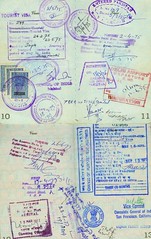 Taking care of travel insurance and working out visa requirements should be looked into several months before leaving on a European vacation. In some cases, visas are required for traveling to Europe, however, most travelers will find that a valid passport is all that is needed for short term tourism and business travel.
Taking care of travel insurance and working out visa requirements should be looked into several months before leaving on a European vacation. In some cases, visas are required for traveling to Europe, however, most travelers will find that a valid passport is all that is needed for short term tourism and business travel.
Visa not required
The European Union (EU) has reciprocal visa programs with many countries including: the United States, Australia, Mexico, Canada, Japan, Argentina, and Brazil among others. Citizens from these countries do not need to apply for a visa as long as their stay will be for less than three months. Even though the United Kingdom is a member nation of the EU, it has slightly different visa rules. Citizens from: the United States, Canada, Japan, Austria, and many areas of South America are given a tourist visa upon arriving in the country which is valid for six months.
Visa Required
Citizens of most areas of Asia and Africa however, are likely to need a visa when visiting Europe. After obtaining a Schengen visa, citizens from these countries will be able to freely travel back and forth between member nations of the EU. The rules however, are slightly different when factoring in European countries that are not members of the EU. Tourist should check with country specific consulate Websites to avoid any problems. For example, Americans do need visas to travel to Russia, Turkey, and Belarus. If you plan on taking an extended holiday in Europe or are seeking employment, visas are likely to be required, regardless of your nationality and the countries visiting.
Insurance Guidance
Europe is home to some of the oldest cities in the world with Paris, Rome, London, Barcelona, Venice, and Prague among the top destinations to visit. Add in the ancient architecture, rich art history, world famous music, famous monuments, delicious food, and incredible sights to enjoy seeing why Europe has one of the biggest tourism industries in the world. With all to experience in Europe, travelers have found vacations ruined by headaches and inconveniences that could have been avoided by purchasing travelers insurance. Cheap travel insurance offers high-quality protection but at a price that will not force travelers to take money away from their vacation. Having this insurance can offer recourse for recovering expenses if a sudden family illness causes a trip cancellation.
For those planning long-term stays in Europe, Medical Evacuation insurance is even more of a necessity. Very few insurance providers offer any health benefits while in Europe and none provides emergency airlifts back home. When traveling in some areas of Europe, getting this immediate transport out of the country could be the difference between saving your life and dying in a foreign country. Major medical insurance will help travelers living up to a year in Europe to get regular checkups, obtain prescription medications, and receive primary health care.







